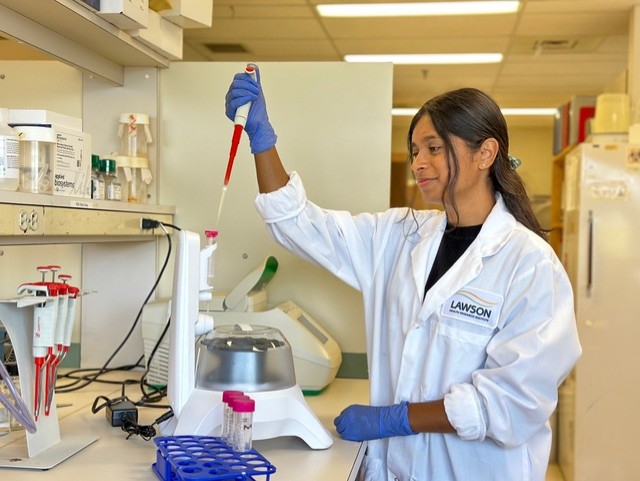Urvi Patel is a 2nd year MSc student in the Department of Anatomy & Cell Biology at Western University. She is conducting BCC-funded breast cancer research under the mentorship of Dr. Alison Allan at the London Health Sciences Centre/Western University.
- What specific areas of breast cancer research are you currently focusing on, and why are they important?
More than 90% of breast cancer deaths occur due to metastasis – the spread of cancer cells to distant organs such as the lung, brain, liver or bone. My research focuses on understanding why and how breast cancer metastasizes to the lung. In particular, I am studying how tiny particles, called extracellular vesicles (EVs), are released by breast cancer cells in order to enhance their ability to spread to the lung. These EVs can travel from the primary breast tumor through the bloodstream and into the lung in order to make changes that will produce a supportive environment for metastatic cancer cells to grow. I am investigating the molecular cargo (such as DNA and proteins) contained within these EVs, the changes they cause in different cell types of the lung, and whether we can inhibit the release of EVs from breast cancer cells using a targeted drug called tipifarnib. With this research, we will be able to better understand the mechanisms underlying breast cancer lung metastasis and explore potential therapeutic strategies to inhibit this deadly process.
- How do you see the future of breast cancer prevention, screening, diagnosis, treatment evolving through research?
There are scientists around the world working towards improving outcomes for breast cancer patients at these various stages. I see this evolving especially from a technological standpoint; as artificial intelligence (AI) continues to grow, novel ways to better screen, diagnose and treat patients will be discovered to improve patient outcomes. For example, advancements in AI have led to enhanced computer detection systems to identify tumors. Furthermore, as we discover more about the heterogeneity of cancer, we can work towards more personalized treatments for patients. This will allow patients to receive care that will best target their cancer based on their genetics and history.
- Can you discuss any challenges or obstacles you’ve encountered in your breast cancer research, and how you’ve overcome them?
One of the challenges that I have encountered in my research was finding a way to isolate EVs from breast cancer cells. To overcome this, I explored two different technical approaches of isolation including a technique called size exclusion chromatography which separates particles based on size, and a second technique called ultracentrifugation which spins down particles at very high speeds. I spoke to other scientists in the field that were experienced in isolating EVs to establish effective and reproducible protocols for isolation. Now that I have overcome this challenge, I can use these isolated EVs for the studies described above.
- What advice do you have for young individuals interested in pursuing a career in breast cancer research?
There are several ways for young individuals who are interested in pursuing a career in breast cancer research to get involved and learn more about the field. My advice would be to look into current studies and connect with researchers who are exploring topics that you are interested in. I think it is crucial that young individuals realize that breast cancer research extends beyond basic biology as researchers take advantage of novel technologies for breast cancer screening and diagnosis. By networking with other researchers in the field, you can expand your own knowledge while discovering different specializations. These connections are also a great way to find potential research volunteering positions or internships that will expose you to hands-on lab experience.
- In your opinion, what role can public awareness and advocacy play in advancing breast cancer research and treatment?
Public awareness and advocacy are fundamental in advancing breast cancer research and treatment. It allows the public to stay informed about the current progress in the field as new discoveries are continuously being made. That allows individuals to take preventative action, be proactive regarding their own health and also reduce misinformation. Public awareness leads to development of supportive networks that allow researchers and patients to connect and is especially important for driving fundraisers that support research focused on improving clinical outcomes.




